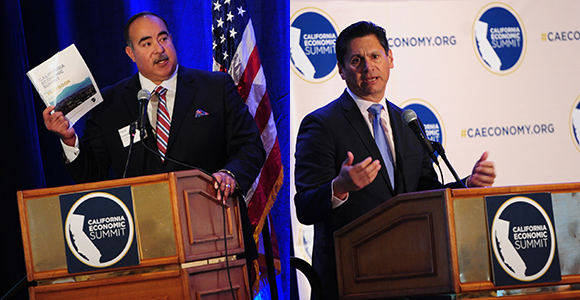
Paul Granillo (left) and Eloy Ortiz Oakley at 2015 California Economic Summit (Photo Credit: Violeta Vaqueiro)
Originally published in the Los Angeles Daily News
The numbers are staggering. Nearly 13 million Californians live below or just above the poverty line. That would be the sixth-largest state in the union.
When the California Economic Summit gets together December 13-14 in Sacramento, our most vulnerable will be on our minds. In a state that has our wealth and energy, we can do better.
The Economic Summit, now in its fifth year, has mobilized literally thousands of Californians from the various and distinct regions of our state and created The Roadmap to Shared Prosperity. It includes some critical things that must occur to attack poverty and make sure that the California Dream is possible for all Californians.
It’s fair to ask, how did we get here?
The cost of living is outpacing wages. Housing costs are making it hard for millions of California families to make ends meet.
There is a skills gap because we aren’t training people fast enough or well enough for the millions of middle skills jobs that exist.
California also doesn’t have enough well-paying jobs.
What do we do? This is where the Summit’s work is making real progress.
A year ago, we issued the three one-million challenges: building one million new homes, training one million workers and saving one million acre feet of water per year.
Progress is being made.
There isn’t an easy solution to housing because there are so many competing interests. So, we spent the last year working to get them together. A coalition of builders, housing advocates, equity groups, environmentalists and local government leaders has contributed to a policy framework that we’ll firm up next week and bring to the governor and the Legislature.
Talk to employers from health care to manufacturing to logistics and they’ll tell you they need workers better trained for the jobs that exist. The Summit led a coalition that supported the creation of a new $200 million Strong Workforce Program for promoting career technical education. It’s already bearing fruit. The iCAPS program in Los Angeles is training faculty on the latest employer needs in information technology and digital media, and community colleges across the state are working to develop curriculum that will help California prepare the “net-zero workforce,” to work with technologies that are designed to reduce energy and resource use.
The Summit pushed the new concept of Enhanced Infrastructure Financing Districts (EIFDs), a robust new financing tool for local governments looking to pay for local infrastructure and economic development. Southern California leaders think the tool can help meet the needs for transportation, housing and infrastructure. The city of Los Angeles is looking at using it to restore the L.A. River, and the city of La Verne and L.A. County and others are looking at it for a mixed development for housing and transit.
The Summit is now working with regional water leaders to better connect land use planning and water management and to allow more communities to govern, pay for and manage local water projects.
The Summit is making a difference in addressing these thorny problems that plague California. These solution ideas and the energy to implement them didn’t start in Sacramento — they started in the various regions of California.
These solutions — and others that will be identified as we continue our work — have a triple bottom line result — they are good for the economy, promote social equity and meet our high standards for environmental sustainability. They are achievable because people from across California work year-round to define and refine them.
It’s been five years now since the Summit began.
The work continues.
It’s too important to stop.
See you in Sacramento.
Paul C. Granillo is president and CEO of the Inland Empire Economic Partnership. Eloy Ortiz Oakley is superintendent-president of Long Beach City College, a UC regent and will become chancellor of California Community Colleges later this month. Granillo and Ortiz Oakley serve as co-chairs of the California Economic Summit Steering Committee.

